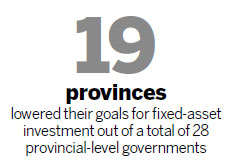Provinces scale back 2014 investment targets
By Zheng Yangpeng (China Daily) Updated: 2014-01-28 07:54More local governments place greater emphasis on quality of economic growth instead of sheer size
Many provincial-level governments have cut their 2014 growth targets for fixed-asset investment, a sign of increasing downward pressure and a shifting emphasis to the quality of growth rather than the scale.
Of the 28 provincial-level governments that have released their growth targets, 19 lowered or even cut their goals for fixed-asset investment. Only Guangdong and Yunnan provinces and the municipality of Tianjin raised their targets.
The largest reductions were in Jilin, Guizhou, Gansu and Xinjiang, which cut their target rates by five percentage points from last year.
Reduced investment targets go hand-in-hand with lower GDP growth targets for this year. Except for Guangdong, all other provincial-level governments that have released GDP growth goals have set lower targets or kept them unchanged from last year.
For years, fixed-asset investment has been the pillar of China's economic growth. The China Academy of Sciences has estimated that the ratio of capital formation to GDP climbed from 47.1 percent in 2012 to 55.2 percent in 2013. That means any slowdown in investment growth cuts into economic expansion.
"You've got to slow. Part of the reason is the already large numbers. You can't sustain a 10 percent growth rate forever. Part of the reason is the rebalancing from exports and production to domestic consumption," said Tim Craighead, director of Asian research at Bloomberg Industries.
China's economic growth rate has slowed in the past two years. Many economists have said the central government will set a 7.5 percent GDP growth target for this year, the same as in 2013.
But Craighead said that while part of the rebalancing might mean a reduced level of investment, "a bigger point" of rebalancing is "making the right investment".

He said: "There are still tons of investment opportunities in new transportation, technology, healthcare and so on that can be quite efficient."
Liu Ligang, chief China economist with ANZ Banking Group Ltd, agreed that there is still ample room in China for investment.
"The key issue for investment is how to rationalize resources. China needs to scale up investment in the service industries as it undergoes massive urbanization and an industrial upgrading process," Liu said.
China's top leadership has already demonstrated its willingness to sacrifice the nation's growth rate in return for more sustained and balanced growth.
In a December announcement by the Organization Department of the Communist Party of China, the ruling party said that it will abandon the "GDP ranking" system in provinces, counties and prefectures.
Officials in poor counties and ecologically vulnerable regions will be exempt from evaluation with reference to GDP performance.
The central government has also for the first time identified "curbing local government debt buildup" as a key goal in 2014. The effort will inevitably dent the expansion rate of investment, according to a Bloomberg report.
- How to invest your year-end bonus?
- Foreign iron investment urged
- Investment from China beneficial to Africa
- Fosun, Prudential get cozier on investment
- Hanergy to invest $500m in Cote d'Ivoire solar project
- Iran to seek foreign investment in oil at Davos
- Real estate giant invests billions of pounds in UK
- Iran invites foreign investment at Davos forum
- NHTSA says finds no 'defect trend' in Tesla Model S sedans
- WTO rare earth ruling is unfair
- Amway says 2014 China sales may grow 8%
- President Xi in Europe: Forging deals, boosting business
- CNOOC releases 2013 sustainability report
- Local production by Chery Jaguar Land Rover this year
- Car lovers test their need for speed in BMW Mission 3
- China stocks close mixed Monday

















